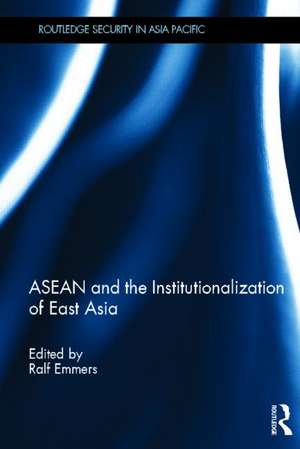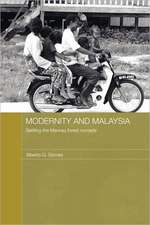ASEAN and the Institutionalization of East Asia: Routledge Security in Asia Pacific Series
Editat de Ralf Emmersen Limba Engleză Hardback – 28 sep 2011
Din seria Routledge Security in Asia Pacific Series
-
 Preț: 326.36 lei
Preț: 326.36 lei - 18%
 Preț: 1165.73 lei
Preț: 1165.73 lei -
 Preț: 387.49 lei
Preț: 387.49 lei - 26%
 Preț: 821.87 lei
Preț: 821.87 lei -
 Preț: 390.37 lei
Preț: 390.37 lei -
 Preț: 411.85 lei
Preț: 411.85 lei -
 Preț: 466.29 lei
Preț: 466.29 lei - 18%
 Preț: 1167.71 lei
Preț: 1167.71 lei -
 Preț: 132.04 lei
Preț: 132.04 lei - 18%
 Preț: 1002.99 lei
Preț: 1002.99 lei -
 Preț: 261.75 lei
Preț: 261.75 lei -
 Preț: 476.60 lei
Preț: 476.60 lei -
 Preț: 485.32 lei
Preț: 485.32 lei - 14%
 Preț: 325.34 lei
Preț: 325.34 lei -
 Preț: 412.74 lei
Preț: 412.74 lei -
 Preț: 486.42 lei
Preț: 486.42 lei - 19%
 Preț: 269.76 lei
Preț: 269.76 lei - 18%
 Preț: 736.24 lei
Preț: 736.24 lei -
 Preț: 260.07 lei
Preț: 260.07 lei -
 Preț: 282.69 lei
Preț: 282.69 lei - 18%
 Preț: 1053.92 lei
Preț: 1053.92 lei -
 Preț: 484.47 lei
Preț: 484.47 lei -
 Preț: 467.44 lei
Preț: 467.44 lei -
 Preț: 463.58 lei
Preț: 463.58 lei -
 Preț: 471.25 lei
Preț: 471.25 lei - 18%
 Preț: 1227.03 lei
Preț: 1227.03 lei -
 Preț: 449.26 lei
Preț: 449.26 lei -
 Preț: 316.83 lei
Preț: 316.83 lei -
 Preț: 343.82 lei
Preț: 343.82 lei -
 Preț: 389.66 lei
Preț: 389.66 lei - 18%
 Preț: 1002.63 lei
Preț: 1002.63 lei - 43%
 Preț: 214.23 lei
Preț: 214.23 lei - 18%
 Preț: 1162.84 lei
Preț: 1162.84 lei
Preț: 1060.52 lei
Preț vechi: 1293.32 lei
-18% Nou
Puncte Express: 1591
Preț estimativ în valută:
202.93€ • 212.41$ • 168.90£
202.93€ • 212.41$ • 168.90£
Carte tipărită la comandă
Livrare economică 31 martie-14 aprilie
Preluare comenzi: 021 569.72.76
Specificații
ISBN-13: 9780415614344
ISBN-10: 0415614341
Pagini: 248
Ilustrații: 2 b/w images, 1 table and 2 line drawings
Dimensiuni: 156 x 234 x 20 mm
Greutate: 0.62 kg
Ediția:1
Editura: Taylor & Francis
Colecția Routledge
Seria Routledge Security in Asia Pacific Series
Locul publicării:Oxford, United Kingdom
ISBN-10: 0415614341
Pagini: 248
Ilustrații: 2 b/w images, 1 table and 2 line drawings
Dimensiuni: 156 x 234 x 20 mm
Greutate: 0.62 kg
Ediția:1
Editura: Taylor & Francis
Colecția Routledge
Seria Routledge Security in Asia Pacific Series
Locul publicării:Oxford, United Kingdom
Public țintă
PostgraduateCuprins
Part I: ASEAN’s role in institutional developments in Southeast Asia 1. State weakness and political values: ramifications for the ASEAN Community - Christopher B. Roberts 2. Non-traditional security challenges, regional governance, and the ASEAN Political Security Community (APSC) - Mely Caballero-Anthony 3. Functional cooperation and ASEAN institutionalization: responding to HIV/AIDS - Alan Collins Part II: ASEAN’s role in multilateralism and security cooperation in East Asia 4. Driving East Asian regionalism: the reconstruction of ASEAN’s identity - Herman Joseph S. Kraft 5. The fallacy of socialization? Rethinking the ASEAN Way of institution-building - Takeshi Yuzawa 6. The ASEAN Regional Forum and preventive diplomacy: a review essay - Ralf Emmers and See Seng Tan Part III: ASEAN’s role in the institutionalization of great power relations 7. Institutions and the great power bargain in East Asia: ASEAN’s limited "brokerage" role - Evelyn Goh 8. ASEAN centrality imperiled? ASEAN institutionalism and the challenges of major power institutionalization - Alice D. Ba 9. The institutionalization of ASEAN–China relations: managing the South China Sea dispute - Ian J. Storey Part IV: ASEAN and alternative approaches to regionalism 10. Great powers and multilateralism: the politics of security architectures in Southeast Asia - William T. Tow 11. Explaining ASEAN’s resilience: institutions, path dependency and Asia’s emerging architecture - David Capie 12. The Northeast Asian Trilateral Summit as an alternative security architecture - Chong Wook Chung
Notă biografică
Ralf Emmers is Associate Professor and Coordinator of the Multilateralism and Regionalism Programme in the S. Rajaratnam School of International Studies at Nanyang Technological University, Singapore. Publications include Geopolitics and Maritime Territorial Disputes in East Asia and Cooperative Security and the Balance of Power in ASEAN and the ARF (both published by Routledge).
Recenzii
"Emmers’ book is recommended to those interested in regional security dynamics and the fascinating case of East Asian regionalism that involves big powers and yet gives so much power to the smaller ASEAN countries." - Timo Kivimäki, University of Helsinki; Pacific Affairs Volume 86, No. 2 – June 2013
Descriere
This book examines the evolving multilateral security arrangements in East Asia. It discusses the role of ASEAN, highlighting its successes and its deficiencies, including the fact that it is confined to Southeast Asia and has among its members none of the major East Asian powers nor any of the external powers such as the United States which have a strong interest in the region.












